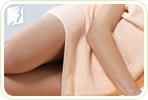Fact
Vaginal dryness is one of the many difficult, though common, symptoms of menopause. Fortunately, there is a wealth of information that can help sufferers manage these symptoms.
Read on to learn about the causes and treatments for vaginal dryness.
What Is Vaginal Dryness?
Vaginal dryness is the loss of moisture and thinning of the vaginal lining. While women of all ages can suffer from vaginal dryness, women who are pregnant, breast feeding, or going through menopause are most likely to experience it.

The vagina is typically maintains moisture through mucus membranes produced in the uterus. It is the hormone estrogen that aids these membranes in producing lubrication to keep the vagina moist and strong. Estrogen also works to prevent painful friction that occurs in intercourse due to vaginal dryness. The mucus membranes in the vagina are also in charge of producing a highly-acidic lubricant that protects the vagina from bacterial or fungal infections.
What Can Be Done about Vaginal Dryness during Menopause?
Because vaginal dryness primarily occurs due to estrogen loss, restoring hormonal levels to normal is the most effective way to find relief. A healthy diet and regular exercise regime are often key in giving the body the support it needs to maintain estrogen levels and in general hormonal balance.

Treatment options for vaginal dryness depend on the severity of your symptoms, your medical history, and personal preferences. If you are experiencing severe vaginal dryness, your doctor may suggest either hormone replacement therapy (HRT) or Tibolone, a synthetic steroid.
Another option surrounding a healthy nutrition and hydration program should involve alternative therapies, like meditation, acupuncture, or herbal supplements. These medicines often work by targeting the hormonal deficiencies at their source. Your doctor may also suggest vaginal products, such as lubricants, rings, suppositories for relief.
Click on the following link to learn more about the treatments for vaginal dryness in menopausal women.
Sources
- Love, Susan, M.D. Menopause and Hormone Book. New York: Three Rivers Press, 2003.
- "Vaginal Dryness". Mayo Clinic Health Resource. 2007.
- The Changing Body: Menopause Handbook. (n.d)."Vulvovaginal Symptoms". Retrieved from www.menopause.org



